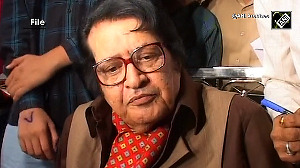Pushing for inclusion of Prime Minister in Lokpal's ambit "with adequate safeguards", the Communist Party of India-Marxist on Wednesday insisted that all public servants should fall within the ombudsman's purview.
Noting that a "nexus of big corporates, politicians and bureaucrats have matured under the neo-liberal regime and is threatening to subvert our democracy", the party said firm steps, including creation of the Lokpal, need to be taken to break this nexus.
"It is clear that the current economic regime has made our system more vulnerable to cronyism and criminality. Only a comprehensive systemic reform can effectively curb corruption," senior CPI-M leader Sitaram Yechury said at the all-party meeting on corruption and Lokpal in New Delhi.
A note, circulated on behalf of the major Left party detailing a series of measures to counter corruption, said the Prime Minister should be brought under the purview of Lokpal with adequate safeguards.
Observing that the government was "presiding over a large number of scams" and "unwilling" to ensure accountability of the highest executive office, it said "all public servants of the Union government within the definition in the Prevention of Corruption Act, which includes the Prime Minister, must fall within the purview of the Lokpal".
Maintaining that the system to scrutinise MPs on corrupt practices was now "weak and unsatisfactory", the CPI-M said the real issue was how to ensure that their freedom and protection does not extend to acts of corruption.
"This can be done through an amendment to Article 105, on the lines recommended by the National Commission to Review the Working of the Constitution", it said.
Regarding the accountability of judiciary, the CPI-M suggested that complaints about corruption against judges of Supreme Court and high courts should be handled by a separate body -- the National Judicial Commission.
This Commission should take care of the appointments in the higher judiciary and oversee their conduct and enquire into the complaints of corruption", it said, maintaining that the Judicial Standards and Accountability Bill, 2010, which is before Parliament, was "woefully inadequate".
Observing that the definition of graft in the current anti-corruption law should be widened, it said this should include "willfully giving any undue benefit to any person or entity or obtaining any undue benefit from any public servant in violation of laws or rules".
The CPI-M note also recommended a law to protect the Citizens Charter for redressal of public grievances, creation of Lokayuktas in all states to cover all public servants at the state-level, electoral reforms to check money power in elections, apart from steps to unearth black money and to confiscate the funds illegally stashed away in tax havens.
Maintaining that these measures should complement the Lokpal, the party said the anti-corruption body should be entrusted with "quasi-judicial powers and autonomy to fulfill its functions in an independent, accountable, transparent and time-bound manner".
The Lokpal institution should conform to the basic structure of Constitution that separates powers between legislature, executive and judiciary, the CPI-M said.
Lokpal should not only probe cases involving business entities, but also have powers to recommend cancellation of licences, contracts, lease or agreements obtained by corrupt means, besides recommending blacklisting companies from getting government contracts and licences. It should also recommend concrete steps to recover the loss caused to the public exchequer.









 © 2025
© 2025